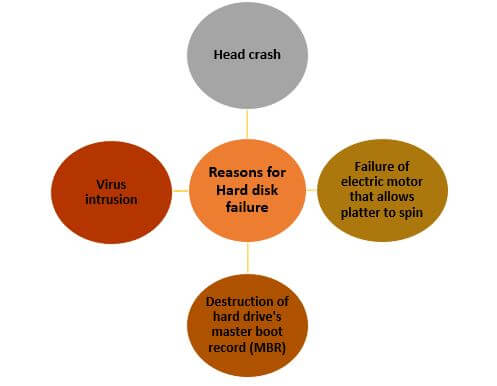The market is numerous free software tools available to fix hard drive failure; however, these software’s are useful only to some extent. There is a risk associated with the hard drive data recovery if you don’t know what you’re doing and may end up with a severe hard drive failure. The blogs guides about risks & how to resolve fix hard drive failure.
Hard Drive: The Cornerstone of your Computer
While there have been numerous innovations, hard drives belong to that subset of innovations. Today’s time demand individuals and organisations to quickly get accustomed to changes and act accordingly; hence, the ability to analyse and implement
prompt action on data is essential. It is also equally important to store that data, and that’s where the significance of hard drive comes into play.
Hard drives are just another element of computers, and when coupled with processors
and computer peripherals, it can do wonders. 1965, IBM developed the very first hard drive for accounting purpose, and in the modern era of personal computer and servers, the hard drive
can be found in almost every electronic gadget that you have ever held, from digital cameras to smartphones, from set-top boxes to camcorders. To access any data on your system, you need to have a hard drive.
How Does Hard Drive Function?
The hard drives use magnetic storage to store all information & data. To retrieve data on the platters the magnetic heads mounts on a moving actuator arm. The data stored is in the form of fragments, and not as a single chunk on the HDD platters. Hard drives use magnetism to store data; the platters have a coating of aluminium and copper that can be magnetised and demagnetised.
Hard Drive Fails Too.
They don’t come with an expiry date, but they have a lifespan also. Anything can go wrong, and you may not even have the slightest of the idea that your hard drive is likely to fail in the next operation.
Hard drive failures occur when
the hard drive malfunctions and you cannot access the data/information stored in it. If you experience hard drive ‘crash’ or ‘failure’ problem, then you may lose your valuable data and might require external assistance to recover it.
What is Hard Drive Failure?
As hard drive is a mechanical device, it is likely to fail with time. Hard drives can fail either due to mechanical failures or through misuse. Let’s look at some of the some of the reasons as to why hard disk fails.

Some other reasons are improper ventilation, improper maintenance, inappropriate ejection or insertion operations, extreme heating, and faulty CPU fan and so on.
What are the Types of Hard Drive Failures?
There are two types of hard drive failure:
Physical Failure:
Occurs due to mechanical failure of the hard drive, i.e. failure of the electric motor to spin the platter, head crash, inadequate ventilation, hard drive or laptop dropped, platter damage etc.
Logical Failure:
Accidental deletion of files or registry entry, unintentional formatting of the hard drive, virus or malware attack, compatibility issues, disk errors, detection issues, etc. refers to logical failure.
Failing Hard disk: Symptoms
There are symptoms of hard disk failure, and the quicker you respond to the signs. Before proceeding further, you need to understand where the real problem lies. Has your hard drive crashed? Dead? Damaged? Or formatted? These are different scenarios which are likely to cause hard drive failure.
- Crashed Hard drive: If you’re unable to boot your system or hear bizarre noises such as humming or clicking, its sign of hard drive crash.
You should immediately stop using the system and not try to perform any operations. - Dead Hard drive: Failure of the electronic circuit components making the hard drive inoperable.
- Damaged Hard drive: External conditions such as natural calamities, water and fire damage etc.
| Symptoms | Possible Cause |
|---|---|
| System crashes frequently | Overheating of the computer, CPU under heavy use |
| Bad sectors | Magnetic sectors may have become faulty |
| Important files are missing | Accidental deletion of file systems, formatted hard drive |
| System takes excessive time to start-up | Faulty hardware, electric motors may have burnt out |
| System takes a long time to display the contents of file folders | Corrupt header or file system |
Solution For Hard Drive Failure:
Several third-party applications address the issues of hard drive failures, many of which are freely available in the marketplace. There is no guarantee that these free tool/software can recover your data, it can further aggravate the situation. When you don’t know where you’re heading towards with these available applications, you may end up losing the data.
The best precautionary measure is to have an updated backup of your critical data as you never know what might get wrong and in such times, at least you can recover your data efficiently. Try to refrain from repairing the hard drive on your
own as all your efforts may not work out.
To prevent further damage, seek the assistance of a reliable hard drive recovery services provider. Instead
of implementing the head-in-the-sand approach, approaching a specialised data recovery service provider is far more feasible.



